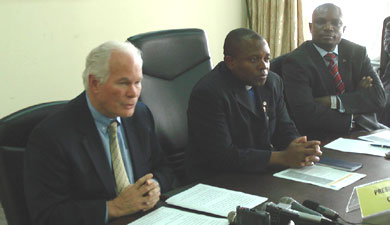The new United Nations Development Programme’s PACE project, which will support and assist the DRC electoral cycle from 2007 to 2011, was launched in Kinshasa on 4 October 2007. Initially the US$151 million project aims to assist and support the organisation and holding of the DRC local elections, envisaged for 2008. 
UNDP country director Mr. Babacar Cisse, UN agency coordinator in the DRC Mr. Ross Mountain, as well as Independent Electoral Commission (IEC) President Fr. Malu Malu were present at the launch of - PACE - the Project of Assistance to the Electoral Cycle in the DRC, held in the IEC’s headquarters in Kinshasa.
The DRC envisages the holding of local elections and the creation of a National Independent Electoral Commission (CENI), which as a replacement for the IEC is mandated by the new DRC constitution to organise future elections.
The PACE project’s first goal will be to assist the CENI to complete the identification and registration of voters, and to hold the forthcoming local elections.
In addition, PACE aims to reinforce the capacities of the CENI and its structures (with a particular focus on aligning the electoral lists and the installation of a permanent electoral file); to support the installation of a resource and training centre and to reinforce CENI’s partnership with other institutions.
UNDP country director Babacr Cisse said that because of their experience, the IEC were ‘a reference for all African countries.’
“We have already established competencies to support the elections, which will be transferred soon from the IEC to the CENI, to launch the activities of this new institution,” he added.
Mr. Ross Mountain said it was ‘essential to complete the democratic process in the DRC.’
“After 40 years, it is essential to sow the democratic process, not only at a national and provincial level, but at a local level. In this way, the people can elect their own representatives in order to take part in a real and complete democratic process,” he added.
IEC President Fr. Malu Malu said that ‘one election was not enough.’
“We need to work hard so that competent electoral administration becomes a reality in the DRC. In particular we must prepare the local elections, but we must begin preparing today for the general elections in 2011. It is therefore a big challenge for us,” he added.
Among the challenges for the DRC local elections include the management of over 200,000 candidates, compared to 22,500 candidates for the 2006 elections, as well as the compilation and verification of results, all of which have to be done at a local level.
Related articles
- • Tshisekedi Says He Won, Can He Prove It? (December 17, 2011)
- • 32 Million Congolese Voters Set to Elect Their Leaders (November 27, 2011)
- • 19,497 Candidates to Run for 500 Seats in Parliament (September 26, 2011)
- • 31 Million Registered to Vote (July 20, 2011)
- • Parliament Approves Constitutional Amendments (January 16, 2011)
- • 2010 Human Development Report analyses long-term development trends (November 4, 2010)
- • Parliament to Tackle Elections, 2011 Budget during September Session (September 14, 2010)
- • IEC: Elections to Cost $712 million (August 14, 2010)
- • Malu Malu Challenges Opponents of Elections Timetable (August 12, 2010)
- • Opposition, Civil Society Reject Elections Timetable (August 11, 2010)
- • Electoral Commission Sets Date for 2011 Presidential Election (August 9, 2010)
- • Kabila Signs Bill Creating New Electoral Commission (July 30, 2010)
- • Government, IEC Confirm 2011 Elections (April 27, 2010)
- • African development needs more actions, less words (August 15, 2009)
- • Voter Registration Extended for 15 Days in Kinshasa (August 4, 2009)
- • Voter registration preparations underway (May 5, 2009)
- • France contributes one million euros to support the electoral process in the DRC (August 28, 2008)
- • Fight against malaria continues in the DRC (April 25, 2008)
- • Launch of a Parity Observatory in the DRC (March 6, 2008)
- • DRC signs a $390 million five year governance programme with the UNDP (February 14, 2008)
- • UN SC authorizes MONUC to organize, conduct local elections (January 31, 2008)
- • Ban Ki-moon hails agreement to end violence in eastern DR Congo (January 25, 2008)
- • William Swing leaves Congo with a note of hope (January 11, 2008)
- • Aid tops agenda as Kivus conference gets under way (January 9, 2008)
- • Security Council extends MONUC's mandate until 31 December 2008 (December 24, 2007)
- • Climate change in the DRC and future challenges (December 21, 2007)
- • IEC holds evaluation meeting to point the way forward for 2008 (December 13, 2007)
- • One day plea by Congolese women for equal representation (December 7, 2007)
- • Radioactive Material Dumped Into Congolese River (November 9, 2007)
- • UNDP: the DDR phase III in Ituri proved to be one of the most credible disarmament operations in DRC (November 9, 2007)







